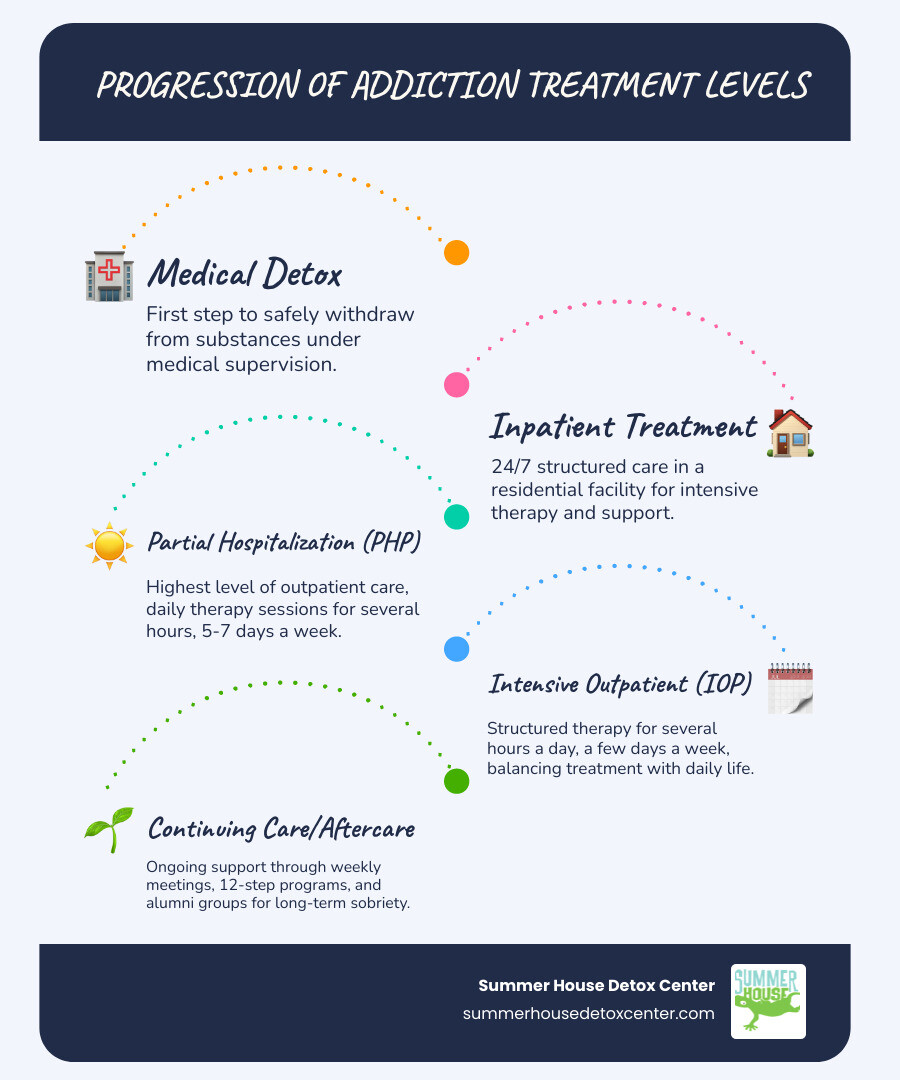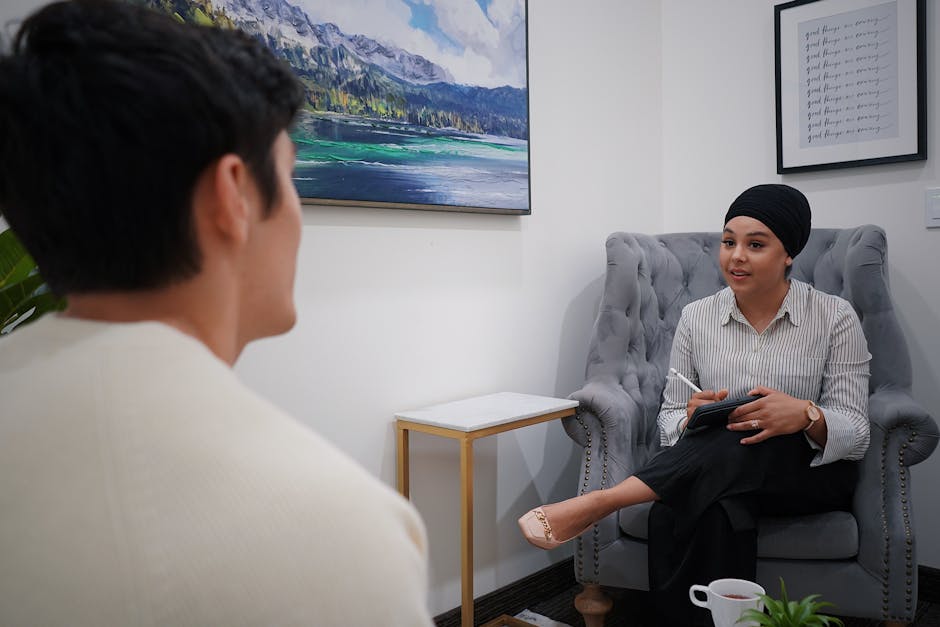Why Outpatient Rehab Centers Are the Bridge to Independent Recovery
Outpatient rehab centers offer a flexible path to recovery that lets you heal while maintaining your daily life. Unlike inpatient treatment, you live at home and attend therapy sessions during scheduled times throughout the week.
Quick Answer for Finding Outpatient Treatment:
- Day Programs (PHP): 5-7 days per week, most intensive outpatient option
- Intensive Outpatient (IOP): 3-4 days per week, several hours per day
- Continuing Care: Weekly sessions for long-term support
- Best for: Those with stable housing, strong support systems, and mild-to-moderate addiction
- Key benefits: Keep your job, stay with family, cost-effective, real-world practice
Recovery doesn’t have to mean putting your entire life on hold. Many people in Miami and throughout Florida find that outpatient programs give them the flexibility they need while still providing professional support and evidence-based treatment.
These programs work especially well as a step-down from inpatient care or for people who have completed medical detox and need ongoing support. You get the tools to handle real-world triggers while building a strong foundation for lasting sobriety.
The beauty of outpatient treatment lies in its ability to meet you where you are. Whether you’re balancing work responsibilities, caring for family members, or simply need a less disruptive approach to recovery, outpatient centers provide the structure and support without requiring you to leave your life behind.

Outpatient rehab centers terms at a glance:
Understanding Outpatient Rehab: A Flexible Path to Recovery

Imagine working on your recovery while still tucking your kids into bed or attending therapy in Miami on your lunch break. This is the reality for many who choose outpatient rehab centers for their path to sobriety. Unlike residential treatment, where you live at a facility 24/7, outpatient programs let you heal while keeping your life intact. You attend scheduled therapy sessions and return home to practice what you’ve learned in real-world situations.
This approach offers several core benefits:
- Affordability: Without room and board costs, outpatient care is more accessible, allowing you to focus resources on quality therapy.
- Flexibility: Programs can work around your schedule, whether you’re a parent in Miami, a student, or can’t take extended time off work.
- Real-World Application: You immediately apply new coping strategies to daily challenges, cementing new habits faster.
- Strong Support Network: You remain connected to your family and friends, who can offer daily encouragement on your recovery journey.
- Privacy and Less Disruption: Integrating treatment into your life is less disruptive and allows you to manage your recovery with more privacy.
| Feature | Inpatient Rehab | Outpatient Rehab |
|---|---|---|
| Living Situation | Live at facility 24/7 | Stay home, attend scheduled sessions |
| Time Commitment | Full-time, highly structured | Part-time, flexible scheduling |
| Cost | Higher due to housing and meals | More affordable, no accommodation costs |
| Ideal Candidate | Severe addiction, unstable home environment | Mild-to-moderate addiction, stable housing, strong support system |
| Medical Supervision | Continuous oversight | Scheduled check-ins and support |
Inpatient vs. Outpatient: What’s the Difference?
Understanding the distinction between these approaches helps you make the best choice for your situation. Inpatient treatment provides 24/7 care in a completely structured environment. You live at the facility, receive constant medical supervision, and focus entirely on recovery without outside distractions. This immersive approach works best for people with severe addictions, those needing medical detox, or anyone whose home environment isn’t safe for early recovery.
Outpatient rehab centers offer scheduled sessions while you continue living your regular life. This integration approach teaches you to steer real-world challenges while staying sober. You receive medical monitoring during appointments, with staff available for support between sessions.
The choice often comes down to the severity of your addiction and the stability of your home environment. If you have a safe place to live, a strong support system, and motivation to change, outpatient treatment might be perfect. If your addiction is severe or your home situation includes active substance use, inpatient care provides the protected environment you need to get started.
Many people in Florida find that these approaches work well together. You might start with medical detox, spend some time in residential treatment, then transition to outpatient care as you build confidence and skills. It’s all part of the same journey toward lasting sobriety.
Types of Outpatient Rehab Programs Available in Florida
Outpatient rehab centers in Florida offer different levels of care because recovery isn’t a one-size-fits-all journey. These programs adapt as your needs change, moving you from intensive support to greater independence. Key options include Day Programs (PHP) for structured support, Intensive Outpatient Programs (IOP) for flexibility, and Continuing Care for long-term maintenance. Sober living homes can also complement these programs by providing a safe, drug-free environment.
Partial Hospitalization Programs (PHP)
If you need the highest level of outpatient care, Partial Hospitalization Programs might be perfect for you. Think of PHP as a full-time job where your job is recovery. You’ll spend five to seven days a week at the treatment center for structured therapy and activities, then head home each evening. This intensive approach is ideal for stepping down from inpatient treatment, offering continued medical monitoring and comprehensive support while you gradually adjust to life outside a residential facility. The structured environment of PHP helps you establish healthy routines and coping strategies through individual therapy, group sessions, and educational workshops.
Intensive Outpatient Programs (IOP)
Intensive Outpatient Programs strike a balance between getting support and maintaining your regular responsibilities. In an IOP, you’ll typically attend sessions for several hours a day, a few days a week, giving you the flexibility to work, attend school, or care for family. A key feature of IOP is its milestone-based approach; as you progress and hit recovery goals, your time commitment gradually decreases. Most programs combine group and individual therapy, helping you build connections with peers while addressing personal challenges.
Continuing Care and Aftercare
Recovery doesn’t end when your initial treatment program does—that’s when the real work begins. Continuing care and aftercare programs focus on relapse prevention and provide ongoing support for long-term success. These programs typically involve weekly meetings to share experiences, work through challenges, and develop healthy coping strategies. Aftercare often includes alumni groups and 12-step programs, which provide a structured approach to maintaining sobriety.
For those in the Miami area, we encourage exploring local support groups that can become part of your long-term recovery plan:
These community resources help you build a sober network right in your neighborhood, creating connections that can last a lifetime.
What to Look for in Quality Outpatient Rehab Centers

Finding the right outpatient rehab center can feel overwhelming, but knowing what to look for makes all the difference. The best centers in Miami and Florida combine professional expertise with genuine compassion, creating an environment where lasting recovery is possible. Look for these key qualities:
- Accreditation and Licensing: Prioritize facilities with accreditation from organizations like the Joint Commission, which signifies high standards for quality and safety. The staff must include licensed therapists and certified addiction counselors.
- Individualized Care Plans: Your treatment plan should be custom to your unique history and goals, not a one-size-fits-all approach. Top-tier centers create living documents that evolve as you progress.
- Evidence-Based and Holistic Therapies: Look for programs using proven methods like Cognitive Behavioral Therapy (CBT) alongside holistic options such as fitness, art therapy, or mindfulness.
- Dual Diagnosis Capabilities: If you have co-occurring mental health challenges, confirm the center can treat both issues simultaneously for a more effective recovery.
- Low Client-to-Staff Ratio: This ensures you get more personal attention and can build meaningful relationships with your treatment team.
- A Full Continuum of Care: The center should support you beyond the initial program, helping you transition between levels of care and providing robust aftercare planning.
How to Know if Outpatient Treatment is Right for You
Deciding if outpatient rehab centers are right for you depends on your specific situation. Outpatient programs work best for people with mild-to-moderate substance use disorders. If you’re dealing with severe addiction or might experience dangerous withdrawal, starting with medical detox and inpatient care is usually the safer route.
Your home environment also matters. A stable, drug-free place to live with a supportive network of family and friends is crucial for success. Outpatient treatment requires a high degree of personal motivation and self-discipline, as you won’t have 24/7 supervision. Finally, ensure any program you choose can address co-occurring mental health disorders like depression or anxiety alongside your addiction. Outpatient care is most effective when you are not actively using substances.
Costs and Financing for Outpatient Rehab in Miami
Worrying about the cost of treatment is normal. The good news is that outpatient rehab centers are generally more affordable than inpatient programs since you’re not paying for room and board. Most quality centers in Miami work with major insurance providers, and many accept PPO plans. Contact centers directly to verify your specific benefits.
If insurance isn’t enough, don’t give up. Many centers offer payment assistance programs or sliding scale fees based on income. Florida also provides state-funded substance abuse treatment programs for eligible residents, which you can explore on the Substance Abuse Treatment Programs – Miami-Dade County website. Many facilities also offer payment plans to make treatment more manageable. Be upfront with the admissions team about your financial situation—they are there to help.
Sustaining Sobriety: How Outpatient Care Supports Long-Term Recovery

Recovery is about building a life you don’t want to escape from, and outpatient rehab centers are designed to support this long-term goal. The real work begins when you return to your everyday world, and outpatient care excels by focusing on real-world application. You practice coping strategies at home, at work, and in your Miami community, with ongoing support to handle triggers as they arise.
Outpatient programs keep you connected to a recovery community through group therapy, family counseling, and alumni events, creating a sustainable safety net. This approach strengthens your sobriety step-by-step, building your confidence to handle life’s challenges without substances.
Developing Relapse Prevention Skills
Learning to prevent relapse is like developing a sixth sense about your recovery. Outpatient rehab centers excel at teaching these skills because you get to practice them in real time, in the very situations where you’ll need them most.
Identifying triggers becomes second nature when you’re actively living your life while in treatment. Maybe you find that certain Miami neighborhoods bring up old memories, or that Sunday afternoons leave you feeling restless and vulnerable. Your therapist helps you recognize these patterns and develop specific strategies for each situation.
Creating coping mechanisms that actually work takes practice, and outpatient care gives you plenty of opportunities to test what works for you. Some people find that a quick call to their sponsor helps, while others prefer deep breathing exercises or taking a walk along the beach. The key is finding healthy alternatives that fit your lifestyle and personality.
Building healthy routines becomes easier when you’re already living at home. You can establish morning rituals that set a positive tone for your day, create evening routines that help you wind down without substances, and find ways to structure your weekends that don’t revolve around drinking or using.
Stress reduction techniques and building resilience go hand in hand. Florida’s year-round sunshine makes outdoor activities accessible, and many people in recovery find that regular exercise, whether it’s swimming, walking, or playing sports, becomes a cornerstone of their stress management toolkit. Learning other ways of coping with stress and relaxing without drugs is essential for long-term success.
The goal isn’t to eliminate all stress from your life – that’s impossible. Instead, it’s about developing the mental and emotional strength to handle whatever comes your way without compromising your sobriety.
The Role of Family and Community Support
Family relationships can be complicated when addiction is involved, but they’re also often the most powerful motivators for getting and staying sober. Outpatient rehab centers recognize this and make family involvement a priority in the recovery process.
Family therapy sessions create a safe space for everyone to address the elephant in the room. Addiction affects entire families, not just the person using substances. These sessions help heal relationships that may have been damaged by years of broken promises, financial strain, or emotional turmoil. It’s not always easy, but it’s incredibly healing when family members can finally understand each other’s perspectives.
Healing relationships takes time and patience. Trust doesn’t rebuild overnight, but with consistent effort and professional guidance, families can emerge stronger than they were before addiction took hold. Many families report that going through recovery together actually brings them closer than they’ve ever been.
Education for loved ones is crucial because good intentions aren’t always enough. Family members need to understand the difference between helping and enabling, how to set healthy boundaries, and what to do if they’re concerned about a relapse. This knowledge empowers them to be genuinely supportive rather than inadvertently harmful.
Creating a sober network in your local Miami community becomes one of the most rewarding aspects of recovery. Miami’s vibrant recovery community offers countless opportunities to connect with others who share your commitment to sobriety. From beach volleyball games to coffee meetups, there are healthy social activities happening throughout the city.
Many people find that their sober friends become some of the most genuine, supportive relationships they’ve ever had. There’s something special about friendships built on shared growth and mutual support rather than shared substances. These connections often extend far beyond recovery, creating a rich social network that improves every aspect of your life.
Conclusion
Recovery isn’t a one-size-fits-all journey, and that’s exactly why outpatient rehab centers have become such a vital part of the addiction treatment landscape. Throughout this guide, we’ve explored how these programs offer something truly unique: the ability to heal and grow while staying connected to your life, your loved ones, and your community.
The flexibility and freedom that outpatient programs provide can be life-changing. You can maintain your job, care for your family, and continue your education while receiving professional addiction treatment. This isn’t just convenient – it’s empowering. You’re practicing recovery skills in the real world from day one, building confidence and resilience as you go.
Outpatient rehab centers represent a crucial step in the continuum of care, whether you’re transitioning down from inpatient treatment or starting your recovery journey with a less intensive approach. The affordability makes quality treatment accessible to more people, while the community integration helps you build a strong, lasting foundation for sobriety right here in Miami and throughout Florida.
We’ve seen how these programs excel at teaching relapse prevention skills, strengthening family relationships, and connecting you with a supportive sober community. The combination of professional guidance and real-world application creates an environment where lasting change can truly take root.
Of course, every recovery journey is unique. For many people, the path begins with a safe, medically supervised detox to ensure you’re physically and mentally prepared for the work ahead. Starting with proper medical care isn’t just about safety – it’s about giving yourself the best possible foundation for success.
At Summer House Detox Center, we understand that taking the first step can feel overwhelming. Our Miami-based facility specializes in providing compassionate, personalized detox care with experienced staff who truly understand what you’re going through. Some of our team members are in recovery themselves, bringing both professional expertise and lived experience to your care.
You don’t have to face this journey alone. Recovery is possible, and it starts with that first brave step forward.
